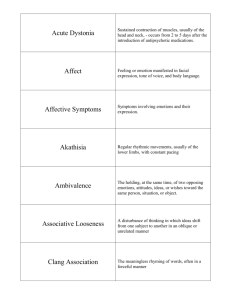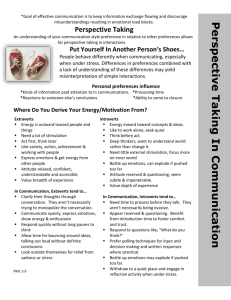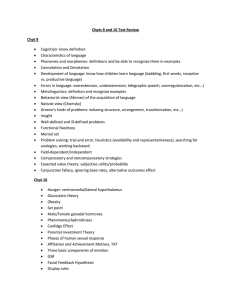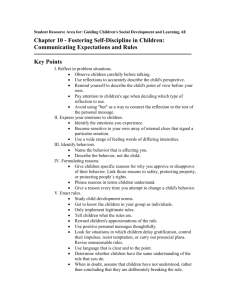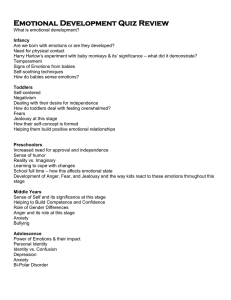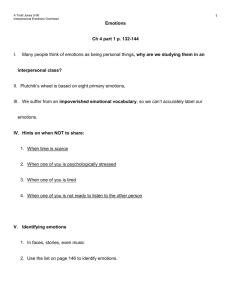Emotions & Emotions vs cognition Hot & cold states
advertisement
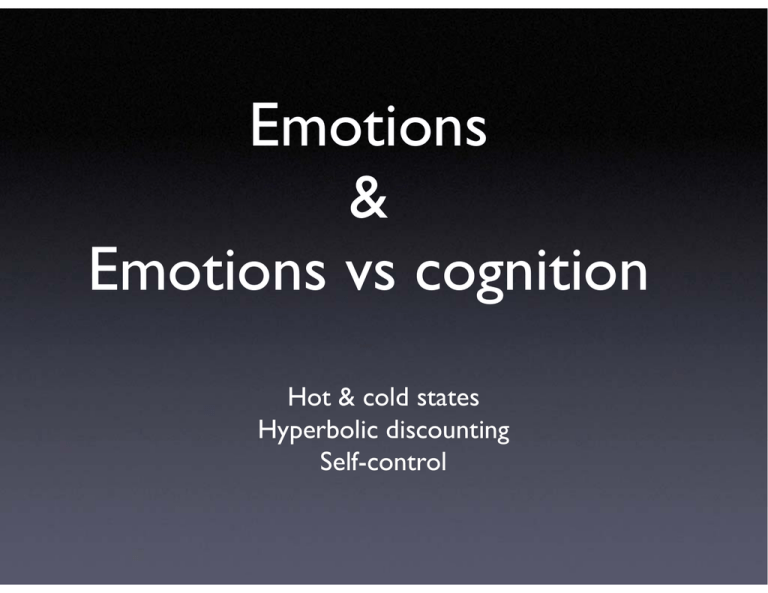
Emotions & Emotions vs cognition Hot & cold states Hyperbolic discounting Self-control Emotions We arrive at the truth, not by the reason only, but also by the heart. -- Blaise Pascal The Human Brain Animal Emotions The limbic system is often thought of as a primitive part of the brain as it is present in lower mammals and parts are even found in reptiles. Animals need emotions to survive - they need fear as a trigger to escape predators and aggression to defend their territory, young and food. Darwin thought emotions were merely left over from our animal past. Limbic System:Amygdala What do we know about emotions? • Emotions are fast • Triggered automatically • Triggered by the environment • Moderated at least partially by cognitive processes • Transitory Emotions, causes or outcomes? • I run because I am afraid? or Am I afraid because I run? • Does it make sense that we could “read” our emotions? How would we do it? • One view is that emotions are basic automatic programs, that when executed just “run” without the ability to interrupt • Examples: fear or heart-beating creates attraction Emotions, causes or outcomes? epi-phenomenon or everything? • Qualia (the subjective experience of emotions) can be considered as nothing else than a side-effect of emotions • Is it a needed side effect? • What is the value of feeling emotions? A few specific effects The durability bias • Relates to the inability to predict adaptation • People over-predict the duration of emotional responses • How long will I feel sad after a break-up? • How long will I feel happy after getting an A in 15.301? • How long will I be angry at... “muscular emotions” • Nodding can have an effect on evaluations • Similar effects can take place for holding pencils, pushing or pulling furniture etc. • Relates to the idea that we can’t directly read emotions and instead we read our actions. Is it better to use emotions or to think? • The answer is not always clear • Sometimes thinking more helps consider other possible consequences and long-term effects • Sometimes thinking too much can make us choose the wrong outcome Wilson & Schooler • “The disruptive effect of analyzing reasons” • Students were asked to evaluate strawberry jams / posters • Some just made a choice and others were asked to deliberate and think about it carefully before making their choice • Who do you think was happier with the product (and how would you measure it)? Why? Emotion summary • Emotions are a powerful force • Emotions are an important input to decisions -small and large -- but often we don’t recognize their effects • Emotions provide a different type of input to decisions than the cognitive system • Emotions are: fast, triggered automatically, triggered by the environment, and transitory Emotions vs cognition • Hot & cold states • Hyperbolic discounting • Self-control Cognition vs emotions • How much are we influenced by these two systems? • Affect has the capacity to turn us into virtually different people Effect of exercise-induced thirst on judgments (VanBoven & Loewenstein) before exercising after exercising sig of difference Mentioned thirst before hunger in essay 19% 50% p<.05 Thirst more unpleasant 61% 92% p<.02 61% 88% p<.05 57% 88% p<.02 52% 92% p<.01 Would regret more not packing water Thirst more unpleasant for hikers hikers would regret more no packing water Photo courtesy of James Gathany Simple systems: men • Two main questions 1) How do people change their decisions under different emotional states? 2) Can they (we) predict this change? DM under emotional states • Hunger • Thirst • Anger • Curiosity • Arousal -- seems more fun to study What kind of DM? • Preferences for different activities • Willingness to take risks • Willingness to engage in undesirable behaviors The procedure • Subjects got a laptop, took it home and used it to answer questions • Two conditions • Cold -- not aroused • Hot -- aroused • Only males • we are currently testing also females Preferences ... Sample questions on preferences • Are women’s shoes erotic? • Can you imagine having sex with a man? • Could you enjoy sex with someone you hated? • If a woman proposed a threesome with a man, would you do it? • Is a woman sexy when she’s sweating? • Would it be fun to get tied up? • Can you imagine getting sexually excited by contact with an animal? • Do you prefer to have sex with the light on? • Is “just kissing” fun? Results: preferences • In a cold state, our participants predicted they will not* enjoy these activities • In a hot state our participants predicted they will enjoy these activities Risk ... Photos courtesy of Katje Zanetta Borba and Davide Farabegoli Sample questions on risk • If you pull out before you ejaculate, a woman can still get pregnant? • Can a woman who is a good friend give you a sexually transmitted disease? • Would you trust a woman you’ve just met who says she is using birth control? • Birth control is the woman’s responsibility • A condom decreases sexual pleasure • Would you use a condom even if you were afraid that a woman might change her mind while you went to get it? Results: risk • In a cold state, our participants were not willing to take much risks • In a hot state our participants were willing to take more risks • Condom related decisions seem different Photos courtesy of Davide Farabegoli and Katje Zanetta Borba Sample questions on undesirable behaviors • To increase the chance a woman will have sex with you, would you: • take a date to a fancy restaurant? • tell a woman that you loved her? • encourage her to drink? • slip a woman a drug? • Would you keep trying to have sex after your date says “no.” Results: undesirable behaviors • In a cold state, our participants were not willing to engage in these behaviors • In a hot state our participants were willing to take engage in these behaviors Summary • Individuals have different preferences / attitudes under different emotional states • Individuals cannot predict this effect or intuit their preferences under a different emotional states • (even common emotional states) • This can lead to many types of undesirable behaviors ...... Topics • Hot & cold states • Hyperbolic discounting • Self-control Decisions & the future Types of discounting Same More Less "Hyperbolic" Now Soon Time Later Much later Intertemporal choice I Which would you prefer: $100 Today or $150 in 4 weeks? $100 in 50 weeks or $150 in 54 weeks? Discount rates decline sharply with length of time to be waited Intertemporal choice II Which would you prefer: 1/2 a box of chocolate Today or a full box of chocolate in 4 weeks? 1/2 a box of chocolate in 50 weeks or a full box of chocolate in 54 weeks? Discount rates decline sharply with length of time to be waited Decisions & the future Types of discounting Same More Less "Hyperbolic" Now Soon Time Later Much later Another “view” Because of the hyperbolic shape, the outcome is “time inconsistent preferences” More later Value Less sooner Time Hyperbolic discount summary discounting means that we want • Hyperbolic one thing at time t1, another at time t2 and • regret it at time t3 The distance to the goal (time, but also physical distance) changes preferences • This can create inconsistent time (distance) preferences • Hyperbolic discounting can arise from the “hotcold empathy gap” Topics • Hot & cold states • Hyperbolic discounting • Self-control Self-control This is another aspect of the conflict between the two systems Self control problems Behavior aimed at self control Hyperbolic discounting + hot & cold inconsistency = self control problems Self-Control problems examples Over eating Impulsive shopping Drug usage Unsafe sex Not saving Nail biting Not going to gyms Curiosity Procrastination Teen driving patterns Overcoming self control problems: Can, and how can, we fight it? • What tools? • What strategies? • What work? • What will not work? "He nodded, drawing deeply on the cigarette. American. Low tar and nicotine. He'd had some trouble finding that kind over here, and he had paid four times the stateside value. But the French brands he had tried had made him cough. Besides, he hoped that hard-to-find expensive cigarettes would help to keep his habit in control" (Morrell 1982, p.6). "There are indeed some people not habitual drunkards, who cannot keep away from any alcohol they may have in the house: so they pay the retailer a very high wage for taking charge of their stock of it, and serving it out to them a little at a time..." (Alfred Marshall, 1919, p. 814). Mechanisms for self-control Rules of behavior (I don’t do X) Pre-commitment (Agreeing to deadlines) Rationing (limiting consumption) Physical distance (e.g., alarm clock across the room) Mental budgeting (e.g., "entertainment budget") A few market mechanisms Paying in advance for the gym Paying premiums for large / small packaging Vacation homes (time sharing) Others? If people take such steps it means that sometime they (we) understand self control problems and try to overcome them. How good are we in this? Can we overcome the problem? • Awareness – Do people have a self-control problem with procrastination? Yes – Do they know it? Yes – Do they use self-imposed deadlines to curb it? Yes • Performance – Do they use self-imposed deadlines optimally? No, but it does help Self-Control problems examples Over eating (diets; fat farms) Impulsive shopping (lists) Drugs usage (pre-commitment) Unsafe sex (advertising, planning ahead) Not saving (Christmas clubs; Freezing credit cards; direct deposit) Nail biting (bitter nail polish) Not going to gyms (paying in advance) Curiosity (?) Procrastination (public deadlines) Teen driving patterns (immediate punishment) Self control in animals Procrastination: Example “If once a man indulges himself in murder, very soon he comes to think little of robbing; and from robbing he comes next to drinking and Sabbathbreaking, and from that to incivility and procrastination” Thomas De Quincey (1785-1859) Supplementary Papers Self-control summary How come we do things we don’t want to? Different selves? Different timeframe? “Hot cold empathy gap”? Can we do anything about it? Strategic self-imposition of constraints on future behavior and choices can help but they need external mechanisms Emotions summary • Two systems: • Cognitive: Cold, conscious, deliberate • Emotion: Hot, fast, instinctive • Sometimes the output from the two systems is different: • Hot & cold states; Hyperbolic discounting; Self-control


